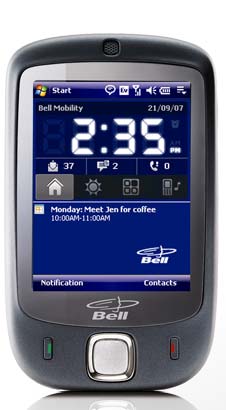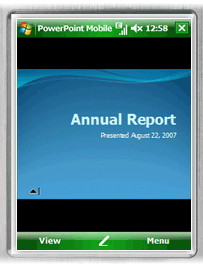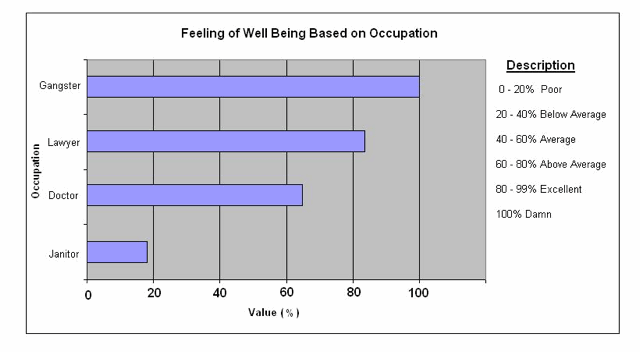Another from Boing Boing: Gangster rap represented as a series of charts and graphs.
Category: Posts
Western Digital disables .avi, .mp3 sharing on external drives
From Boing Boing:
Western Digital is disabling sharing of any avi, divx, mp3, mpeg, and many other files on its network connected devices; due to unverifiable media license authentication.
The support page on the issue effectively notes that the ‘license authentication’ nonsense blocks any type of media from being accessed by anonymous share users.
I don’t own any WD external hard drives at present, but I’m sure as hell never getting one with these ridiculous restrictions, which look like they were penned by a third-world translator. I’ll stick with Seagate, who has decent pricing, good warranty service – and whose CEO is incredibly outspoken:
“Let’s face it, we’re not changing the world. We’re building a product that helps people buy more crap – and watch porn.”
I just found the best Facebook app ever
Dramatic Whitespace. Bring some Zen to your profile.
Update: Apparently the New York Times has profiled this one.
Gmail forwarding slowness on DreamHost accounts
For anyone with a Dreamhost account set up to take advantage of mail forwarding, check out this post on their support site. Mail forwards are being delayed 18-24 hours in my experience.
In the meantime, to check all email routed through Dreamhost, I’ve been using webmail access (http://webmail.yourdomain.com) and also have a second forward going to my Yahoo address. Yahoo accounts, by the way, take advantage of BlackBerry push-style forwarding.
Hopefully the DreamHost staff get this fixed soon!
Accusing customers of fraud on the Internet is a good way to get fired.
One of my most frequently visited forums is a site called Red Flag Deals, which is a bargain-hunting site targetted specifically to Canadians. I’ve learned about a few different money-saving techniques or hot specials on the forums, specifically the American Express Gold 2% Cashback credit card and the ongoing Rogers retention thread.
As you can imagine, I’m always up for deals and promotion codes – in fact, whenever I visit an online retailer’s checkout, I search for “$retailername code” or “$retailername coupon”, which usually yields at least a 5-10% discount for three minutes of looking through search results. If there are no active codes, I’ll usually go ahead with the purchase anyway, but the availability of discounts usually significantly increases my loyalty to the retailer. NCIX, for example, offers pricematching on computer parts if you can find a comparable store selling it for less.
This tendency to want to get deals, however, made me decide to join a Facebook group for free movies from Cineplex properties. Essentially, you have to join the ironically-named SCENE program, then you can redeem two promotional codes for points – the total value of which comes out to two movie tickets. I’ve received similar promotions through corporate and marketing events before with similar values, so it’s not completely out of the ordinary. I expect I’ll actually have to pay something next time I go to the theatre anyways, and I already did give them something I consider equivalent worth: my personal information, or as much as needed to get the account created.
What really gets me, though, is the tendency of people to “Internet White Knight” on behalf of their companies, and completely failing in the process. I only really joined the group to troll a purported employee, who claimed that redeeming these codes was fraud and that we’d all be under police investigation. The statement was so ridiculous, because it was so unwarranted: does a high schooler really care about their employer that much, to risk alienating customers and accusing them of illegal activities? Talk about misdirected priorities.
When you say things online and then immediately note your conflict of interest, you have to be explicitly clear that you’re not speaking on behalf of the company. You also shouldn’t use the “I work for” reference unless it’s warranted, and preferably keep your mouth shut unless you’re a direct stakeholder in the project.
Andre Vrignaud, who works for Microsoft, dealt with this issue earlier this year when he commented – from personal experience – that a PS3 price reduction was imminent; the gaming blogs picked the story up as “MICROSOFT REVEALS SONY’S PLANS.” With that, the Internet lost a greatly insightful viewpoint on the console business, since he now has to be significantly more careful about commenting on competitors. Andre actively tried to indicate that it was his personal opinion being published. So what happens when you don’t make that statement?
It’s impossible to expect complete impartiality from employees, but at least give it a try.
Camtasia Studio and SnagIt: older versions for free
From Digital Inspiration via Lifehacker. TechSmith, makers of Camtasia Studio (software for capturing video demos or “screencasts” from your PC) are giving away slightly older versions of their software for free. I’ve used Camtasia in a former role to edit and produce demos for IBM, and while I probably wouldn’t pay full price for the software, a free version is always excellent.
To grab the software, visit the following posts:
Wireless shakeup: Bell’s unlimited data addon for $7
The latest news from the Bell CDMA camp is raising eyebrows – and is the first volley in a potentially upcoming wireless data price war in Canada. The Toronto Star reports that Bell has launched a promotion: the HTC Touch, a Windows Mobile-based device, is eligible for a $7 per month unlimited data addon to an existing voice plan.
Strictly speaking, this feature is not a new development, but the decision to offer the plan on a PDA certainly is. Bell Mobility customers have been eligible for some time now to purchase the Unlimited Mobile Browser package, the focus of the news article. In technical terms, what “unlimited” really means is “unlimited WAP browsing”.
This definition, while not necessarily consumer-friendly, is much less of a risk for carriers. Customers are limited to accessing mobile-enabled sites serving WML pages. Generally these sites are heavily bandwidth-optimized and require multiple Next Page operations to completely browse the remote site. As a result, carriers don’t typically have to worry about heavy users abusing the system; the $7 fee will usually be quite profitable due to the difficulty and time required to use inordinate amounts of data. Each “page” is generally delivered in under 1KB. WAP sites can also easily be cached on a proxy server, reducing the external bandwidth required on the wireless provider’s part.
Rogers, for example, began offering unlimited WAP access this year within the Rogers-specific WAP site. What’s more, it’s included with any user’s plan without an additional fee. This is more of a marketing technique, though. It only serves to advertise; point to external, revenue-generating WAP sites; and offer costly downloadable ringtones and games. As soon as users leave the walled garden, the charges begin, and they’re not pretty.
Why this plan is so important now, though, is the fact that the HTC Touch is a Windows Mobile device. It contains a suite of Microsoft applications that almost all have one thing in common: they’re Internet enabled, and they can access the full Internet – not some watered-down, proxified version where WAP sites are the only possible destinations. Instead of using a browser limited to SMS-length information retrievals, Windows Mobile devices ship with Pocket Internet Explorer. Pocket IE, while offering nowhere near the advanced capabilities of a desktop Internet Explorer installation, attempts to replicate the full Web experience as closely as possible on a PDA.
Bell, remarkably, has changed the definition of “unlimited mobile Internet” to “unlimited mobile Internet – NO, REALLY, Internet.” Windows Mobile also offers portable versions of Windows Live Messenger and Outlook, not to mention the Office suite of productivity applications. With the HTC Touch’s ability to access significantly greater amounts of data at much higher EvDO speeds, the rules of the game have been changed.

So really, what prompted Bell Canada – for a long time, the only possible phone company – to change their tune? The Toronto Star speculates that the potential threat of Rogers beginning to offer the iPhone could have swayed the decision. Since Apple has shown absolutely zero interest in producing a CDMA-compatible version of their holy grail, and Bell’s national network is rooted in the technology, there is nearly equivalently zero possibility that Bell can deliver an exclusivity arrangement for the device. This means that, much like Verizon and Sprint in the United States, Bell must convince customers that it’s not the device that matters: it’s the network and services. After all, what’s an iPhone really going to cost when data alone on a PDA is $80 per month for 500MB?
The plan also gives Bell a certain level of credibility with tech-savvy consumers. The company (in certain circles) has long been viewed as corporate, inflexible and uncompetitive. Data plans encourage a second look by knowledgeable users, who will drive additional customer adoption by virtue of recommendations.
The GSM versus CDMA technology argument is best hashed out by people on HowardForums, where thinly-veiled trolling over voice quality, network coverage and device swaps is commonplace. One thing’s for sure: Bell is in the perfect position as a carrier to offer this deal, since their CDMA-based network and provisioning structure can effectively limit this plan to eligible Touch users. On a comparable GSM network, users could buy a plan and start using it with a different device in the time it takes to swap SIM cards.
Competing carriers Rogers and Telus should be concerned for their data profits, and rightly so. Enthusiasts and savvy consumers are already taking advantage of the groundbreaking plan in the typically ‘pikey’ fashions: purchasing the device outright on a prepaid plan and adding the data capabilities; negotiation with retentions specialists for reduced data rates; and harassing customer service representatives for “official comments.” The TELUS forum in particular is filled with snarky, baiting posts: clicking a link titled Its Official, Telus’s Official Response To The Bell $7 Data Plan! “…is to deny the whole thing exists, and that Bell is just talking out of their harses, and that its not true!”
(Later on in the thread, the unofficial Telus retention offer seems to be a $15 per month unlimited email/instant messaging plan with 250MB extra data. Not bad, especially if you’re using a BlackBerry instead. ;))
Regardless of who your carrier is right now, it’s certainly a much better time to be a wireless data user in Canada – things are only looking up for the future. Any thoughts or comments about what this development means for your own wireless usage?
Dexter: For your dose of “stabby rip stab stab” with much less emo
In the past, I’ve mentioned to Dave that he’s never steered me wrong with a TV show recommendation. In fact, his selections from digital cable (and mine picked up later the same evening from newsgroups) have been nothing short of excellent: The Sopranos and Entourage have both been two of my favourite programs over the past few years. It’s interesting to note that both of these are typically HBO shows, and I’m always really impressed with the high quality of production.
This past week, I finally gave into another highly-hyped suggestion, and watched the first season of Dexter, a Showtime series.

By day, Dexter is a forensics specialist for the Miami Metro police who deals with blood spatter patterns at crime scenes. His alter ego, similar to Patrick Bateman in American Psycho, is a serial killer. His critical influence, though, is that he only murders people who have killed (usually repeatedly) and not been punished properly by the justice system. He rationalizes his own life and morality with a code of ethics instilled by his foster father, Harry.
True to form, the show is fairly gruesome and graphic, often showing large pools of blood and violent images of crimes.

The dialog in Dexter is supplemented by Dexter’s own narration: there are often periods where the monotone voice of the serial killer serves to advance the plot or indicate his own thoughts about a situation. During these periods, there are many extreme closeup shots of eyes or neutral facial expressions.

I’d really recommend this show to anyone interested in psychological thrillers or a faux-CSI type of plotline. It’s much higher quality TV than I’d expected, and the ending of Season 1 was a fairly decent conclusion. I’m onto Season 2 at the moment and fully expect good things from it.
ev98.net open to the public again
As the title implies, my partially-abandoned project (and collaborative weblogging site) ev98.net is now, once again, open to the public for viewing. Posts marked as “hidden” will still require a login to access, but the hilarious links and content within are back in style.
I do still plan on upgrading Ethanol, the software that powers the site, but on a much more laid-back and iterative scale than originally anticipated. While the code may be unstructured, it’s still served people’s needs since 2004. That’s a pretty awesome project for something I wrote on a whim, starting as “EWMS” (Evergreen Website Management System) intended to hold a lot of emo high school memories.
Shame it’s too late this evening (morning, actually) to get started on any revisions, but I expect I’ll have some downtime to take a look at it in the near future. Rule of thumb: Publish changes early and publish changes often.
Facebook: “Turn down the suck” meter coming
As Borat would say, very nice. Two bugs I’ve been keeping my eye on at the Facebook developer Bugzilla have received official attention.
Bug 724: Give users the option to control which app’s newsfeeds they want to see
and of course, my own submission:
Bug 721: Templatized actions should require link back to application page
I’m not sure how quickly these submissions will be implemented, but it’s good to get a response of sorts on them.
